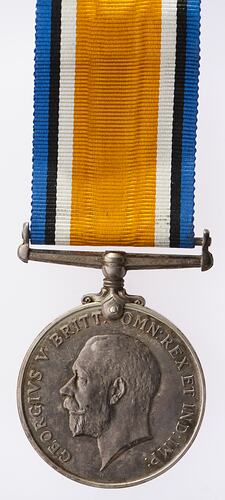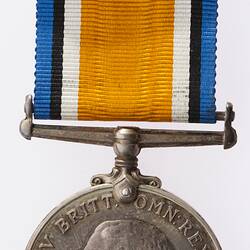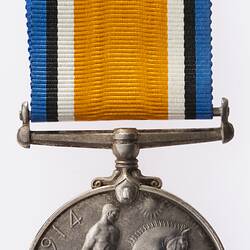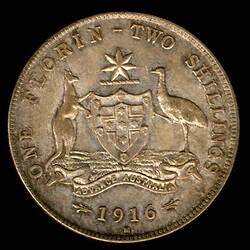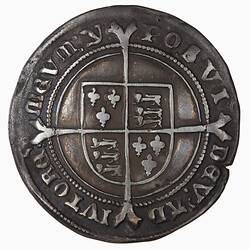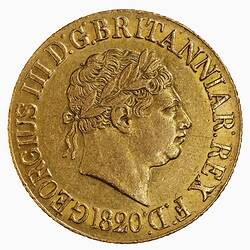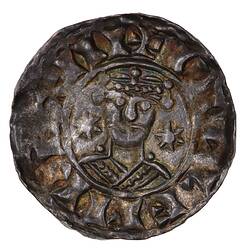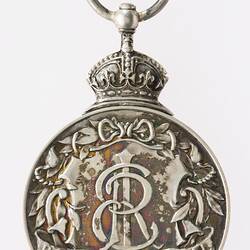Summary
British War Medal 1914-1920 awarded to Sgt. George Foster. service number 1267, 16th Battalion, A.I.F.
Sergeant Foster, an immigrant from England, was a 24 year old labourer when he joined at Morphetville, South Australia on 12 September 1914. His mother in South Australia was initially cited as his next of kin, but later her name was crossed out and substituted with the name of his wife Julia, who lived in London.
George embarked from Melbourne on the Ceramic on 22 December 1914, bound for Egypt. After several months there, he was part of the early landings on Gallipoli. His service record states that he was wounded there on 28 April 1915 (two days later than the donation note suggests). His wound was later described as a gunshot wound to the 'left loin'. His wound was sufficiently severe for him to be sent to England by hospital ship. By September he was able to return to his unit in Mudros, where on 29 October he was promoted to sergeant. From there he apparently sent back to the Dardenelles front, as his wife later writes that he was involved in the evacuation of Gallipoli.
Back in Egypt in May 1916, George was reported to be suffering from venereal disease, later corrected and described instead as 'ademitus of idropathic inguinal' (an undefined groin condition with swelling). He spent several weeks in hospital. On 8 September 1916 he was sent back to England, and on 16 September he was in France. He survived there just four months. Sergeant George Foster was killed in action on 15 January 1917, at Gueudecourt, near Bapaume, France. He was buried at Grass Lane, Gueudecourt. His personal items were sent to his wife: mittens, cap comforter, sergeant's chevrons, whistle, purse, four notebooks, wallet, letters, cards, photos and two coins. She later moved to South Australia.
"The British War Medal 1914-1920, authorised in 1919, was awarded to eligible service personnel and civilians alike. Qualification for the award varied slightly according to service. The basic requirement for army personnel and civilians was that they either entered a theatre of war, or rendered approved service overseas between 5 August 1914 and 11 November 1918. Service in Russia in 1919 and 1920 also qualified for the award."
Obverse Description
Bare head of King George V facing left; text around, 'GEORGIVS V BRITT: OMN: REX ET IND: IMP:'; the artist's initials 'B.M.' (Bertram MacKennal) are on the neck truncation.
Reverse Description
Naked figure of St. George on horseback advancing right trampling a shield bearing an eagle design and a skull and crossbone. Above, the sun; in the background, the ocean; text around, '1914 1918'.
Edge Description
Text; '1267 SGT. G. FOSTER. 16 - BN. A.I.F.'.
More Information
-
Collection Names
-
Collecting Areas
-
Acquisition Information
Donation & Subsequent Transfer from Victorian Branch, Returned & Services League of Australia Limited (RSL), Mrs J. E. Foster, Jan 1984
-
Date Issued
1919 AD
-
Issued By
-
Mint
-
Artist
-
Artist
-
Awarded To
Sergeant George Foster - Australian Imperial Force (AIF), Australia, 1919-1920
1267 Sgt G. Foster, 16th Battalion, A.I.F. -
Place
Gallipoli Peninsula, Turkey
Place wounded -
Inscriptions
Obverse; 'GEORGIVS V BRITT: OMN: REX ET IND: IMP:'. 'B.M.' (Bertram MacKennal - artist). Reverse; '1914 1918'. Edge; '1267 SGT. G. FOSTER. 16 - BN. A.I.F.'.
-
Material
Silver
-
Axis
12
-
Classification
-
Category
-
Discipline
-
Type of item
-
Overall Dimensions
36 mm (Outside Diameter)
-
Shape
Round with mount and ribbon
-
References
References: National Archives records for George Foster - barcode 4023474. from: [Link 1] National Archives of Australia website: [Link 2]
[Book] Joslin, E C., et al. 1988. British Battles and Medals., 228 - 9 Pages
-
Keywords
